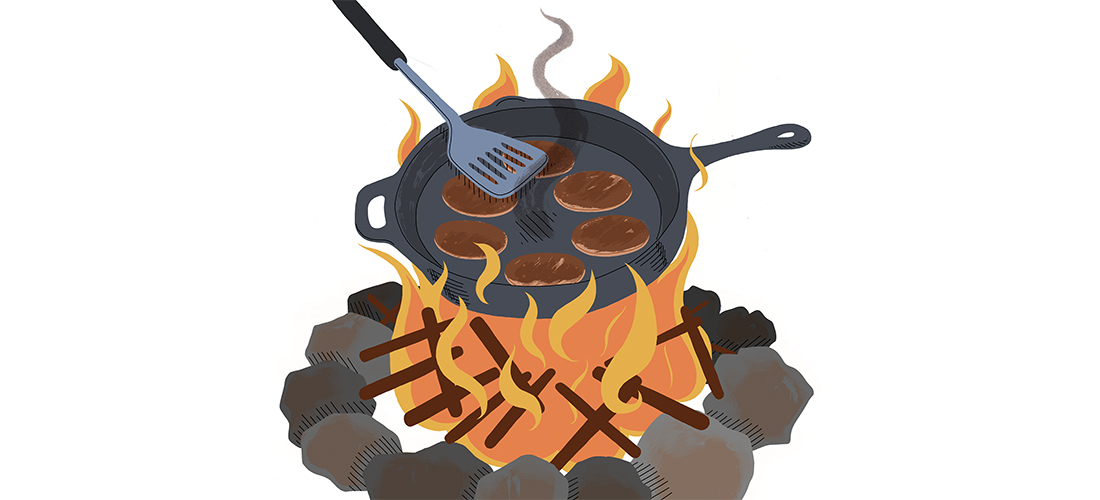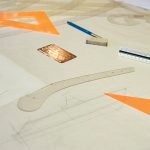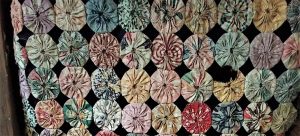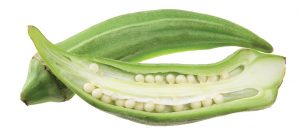
Coming of age in Troop 48
By David Claude Bailey • Illustration by Romey Petite
“Don’t pat the pancakes!”
The voice comes to my 11-year-old ears as if through gauze, muffled but clearly insistent.
I’m hunkering in front of a campfire, dodging the smoke that seems to chase me no matter where I drag the massive cast-iron frying pan in which half-a-dozen pancakes sizzle and pop.
I’m delirious from having spent the night doing what Boy Scouts do on camping trips, swilling soft drinks, telling stories, and feeding our faces and the fire until 2 or 3 in the morning. Once I hit the sack, I’m dealing with a caffeine buzz only achievable in the 1950s before they took the good stuff out of soft drinks, not to mention the two quarts of Double Cola pooling in my bladder. And am I the only one who hears a raccoon raiding the unwashed pots and pans? I get up as soon as I see the slightest glimmer of dawn because I never really did go to sleep and because I’m cold and hungry and someone’s making a fire.
“Bailey. Don’t pat the pancakes.”
It’s our scoutmaster, John Samuels. I could spend a few lines describing his long rangy gait and his penetrating blue eyes below his beetling, sandy eyebrows or his infectious smile that we all want to trigger. But it’s easier just to conjure up John Wayne, whom, to my impressionable eyes, he resembled in every possible way.
I shift yet again away from the smoke, huffing and puffing as I drag the black mass of smoking cast-iron behind me. “Patting them makes them fall so that they’re flat,” Mr. Samuels says, a twinkle in his eye to blunt the bite of his criticism. I stop the spatula a quarter inch from a flapjack, obedient to his command, as yet another finger of smoke finds its way into my stinging nostrils and bleary eyeballs.
Troop 48 was the best thing that ever happened to me, except maybe getting a bike for Christmas when I was 8. The bike freed me from the half-a-mile range of my mother’s booming voice to wander the back alleys of Reidsville with a gang of three, scrounging stuff like an old washing-machine motor that we lugged home and played with until smoke and flames summoned a neighbor.
But it was Boy Scouts that truly liberated me from my Pennsylvania Dutch mother, who was loving, to be sure, but who had a maddening way of insisting there was a right and wrong way to do everything — and there was never any doubt which hers was. She never resisted watching as I tied my shoes — and letting me know that I was still doing it the wrong way.
Nothing beat spending a weekend with boys my age, semi-supervised by a former Merchant Marine turned repo man who, on occasion, packed what looked to me like a huge, black pistol. (I later learned it was a .22-caliber Colt Woodsman.) Like most good teachers, Mr. Samuels liked to fix things. In his case, boys who needed just a bit of guidance and attention at a crucial point in their lives — and at an age, I might add, that didn’t make them particularly appealing to their fathers or anyone else.
I’ll speak for myself. My dad did his best considering that his role model was a father who had nine children and acres of corn and tobacco that had to be tended so that the aforementioned children and wife wouldn’t starve. Plus, during the ’50s, children in my neck of the woods mostly raised themselves without the benefit of Dr. Spock or any helicoptering. Dads, at the prompting of mothers who read magazine articles on that new phenomenon called parenting, occasionally tossed a baseball with their sons or played golf with them (mine never did) or took them fishing and hunting (on rare occasions when other men weren’t available). But most kids were turned loose, along with the dogs, in the morning, and were only noticed if they didn’t come home for supper at night.
Mr. Samuels, who had no children of his own (but a stunning wife who sometimes accompanied him on camping trips), took an interest in whether you knew how to handle a knife or an axe and would show you how to retain your fingers and toes doing so. He’d watch you try to put up a tent and coach you on how to do it in less than an hour. He taught us gun safety, knowing that the subject was, in fact, as serious as death — and your reading this might very well be a tribute to his tutelage.
At 11 and 12, boys are between boyhood and manhood, some still believing in Santa Claus while noticing that they’re growing hair where there didn’t used to be any. On the way to becoming men, boys need mentors. Mr. Samuels took an interest in each and every one of us, even a geeky, one-eyed clumsy mother’s son like myself. I realize now that he liked seeing us grow into men and wanted us to share the values he held dear, which is what Scouting is all about, despite recent revelations and its detractors.
But Troop 48 was not your run-of-the-mill Scout troop. We were a resourceful and mischievous lot who had a reputation throughout the council (and Reidsville) for being wild and crazy. Guilty as charged. Troop 48 viewed jamborees in the same way that some aboriginal tribes regard others occupying open range, a good excuse for a raiding party. Initiations, I’m ashamed to report, could sometimes be described as medieval in their ingenuity. And consider that my best friend taught First Aid to Fritz Klenner, the protagonist in Bitter Blood.
The Chinese invented gunpowder. Troop 48 re-invented the gun. Since South Carolina and Myrtle Beach were only several hours away, any boy who’d recently paid a visit to either one brought fireworks on camping trips. Mr. Samuels never blinked an eye as long as we didn’t disturb his sleep or lose a digit. Armed with hundreds of firecrackers, some clever troop member figured out how to take a firecracker and an acorn and turn a harmless tent pole into a weapon of minimal destruction.
Doubtless thinking that any one of us could throw an acorn a lot harder than the improvised gun could shoot it, Mr. Samuels just shook his head and warned us not to put out anyone’s eye, especially mine. I found the protective glasses my mother insisted that I wear at all times — and actually put them on — and soon we were facing off in Dodge City–style showdowns with shooters, each with his own personal fuse lighter. In the end, someone came up with the idea of replacing the acorn with something a little higher caliber, explosively speaking. This, in turn, required a series of precision actions on the part of fuse lighters that remains highly classified, Troop 48-eyes (or eye)-only information to this day. When the required calculations were just right, the projectile would explode as it flew through the air. When the fuse-lighter’s timing was even slightly off, the tent pole ended up looking like a peeled banana, which Mr. Samuels noticed, thus putting an end to our gunplay.
And here I was in charge of pancakes after telling Mr. Samuels that my mom let me cook breakfast now and again, and his having eaten one of them and saying it was pretty good, if a little flat from my patting it . . . when I saw stars and smoke and flames all at the same time as John Samuels planted his size 12 boot against my backside, kicking me head-first into the fire as I patted, surely, my 20th pancake of the day. In good time, he hove me up like a puppy out of a well, holding and shaking me by the front of my untucked shirt and twisting his head slightly and smiling like a jackdaw. “Didn’t I tell you not to pat the pancakes,” he asked quite reasonably.
I allowed as how he did and how I wouldn’t do it again. He deposited me back in front of the fire after kicking it back into shape and putting the pan back in front of me again, buffing the dirt off the spatula on his pants.
I have never, ever patted a pancake again — or idolized anyone as
much since. OH
David Claude Bailey, who went on to attain the rank of Eagle, is trustworthy, loyal, helpful, courteous, kind, obedient, cheerful, thrifty, brave and clean but rarely reverent.





